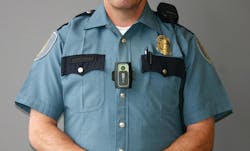The specter of Big Brother and big surveillance programs is capturing headlines in Washington.
But another kind of surveillance -- small, portable and increasingly popular -- is being embraced quietly by police departments across the country, including some in the Kansas City area.
Tiny digital video cameras that can be worn on the belts, bodies, even the glasses of officers are providing police with a new tool to document their interactions with citizens and preserve evidence of crimes.
Proponents of the body camera systems say they can protect officers from false complaints of misconduct. And studies done in some cities show that the presence of the cameras has led to a decrease in instances of officers' use of force.
"We're stopping the 'he said, she saids,'" said Steve Tuttle, spokesman for Taser International, one of the companies that is marketing the systems.
Lenexa police experienced that in January, when a woman called to complain about an officer who she said treated her grandson rudely during a traffic stop. But the officer's body camera showed that the officer acted politely throughout the encounter. When informed of that, the woman apologized, said Officer Dan Friesen, a Lenexa police spokesman.
More than 3,000 police agencies have tried or are using the systems, and that number is growing. The Wyandotte County sheriff's office is the latest in the Kansas City area.
"We just got a couple three days ago that we will be testing," Lt. Kelli Bailiff said recently. "There are a lot of things that in-car video can't record. This is more up close and personal."
The Lenexa Police Department, which began trying the cameras several years ago, has equipped all its patrol officers with body cams.
"Eventually they are going to be widespread," Friesen said. "They have turned out to be a really good tool for us."
The systems are durable and can be activated with the push of a button, and the video they record can be downloaded easily and stored, Friesen said.
Used in conjunction with dash cam videos in patrol cars, they can capture every detail of an officer's interactions with the public.
"If somebody makes a complaint, sometimes they may not be forthcoming with the truth," Friesen said.
January's incident was just one example. In another recorded incident, allegations that an officer threw a suspect to the ground and beat him turned out to be untrue, Friesen said.
In an age where just about everybody has instant access to a cellphone camera, any kind of outside police activity is subject to recording, Tuttle said. But those kinds of videos may not always show the totality of circumstances.
Tuttle cites as an example a recent case in Mesa, Ariz. Video recorded by a resident showed police officers involved in a "rough and tumble" arrest, and it didn't look very good for police. But one officer was wearing a portable camera, and it showed that the suspect triggered the incident by punching the officer in the face.
"It saved the day," Tuttle said of the video.
Police in Rialto, Calif., conducted a yearlong study of the effects of equipping officers with cameras. In the year preceding the experiment, the department received 28 complaints against officers. During the test period, complaints dropped to three.
The study also found that officers not equipped with cameras were more likely to be involved in use of force incidents than were officers with cameras.
Shifts without cameras experienced twice as many use-of-force incidents as shifts with cameras, according to the study.
It found that in all of the videotaped incidents in which force was used by officers, "the subject is clearly seen to be physically-abusive or to be physically resisting arrest."
With no cameras present, officers used force in five out of 17 incidents without being physically threatened.
Tuttle sees it as a simple example of human nature. "People behave better when they're being filmed," he said.
Steve Lovell, the managing director of Vievu, a Seattle-based company that began marketing the portable cameras in 2007, said demand for the systems is "taking off."
Spokesmen for the Kansas City and Kansas City, Kan., police departments said they were not employing the systems, citing the cost of equipping a large number of officers with cameras that can cost $900 or more apiece.
But Lovell said larger cities such as Phoenix and Houston are using grants to purchase and operate the cameras.
Police in Wichita started a pilot project with the cameras in 2011 and have continued to add cameras within budgetary constraints.
"If cost were no object, we would love to be able to outfit all of our officers," said Wichita Police Lt. Doug Nolte.
Copyright 2013 - The Kansas City Star
McClatchy-Tribune News Service



